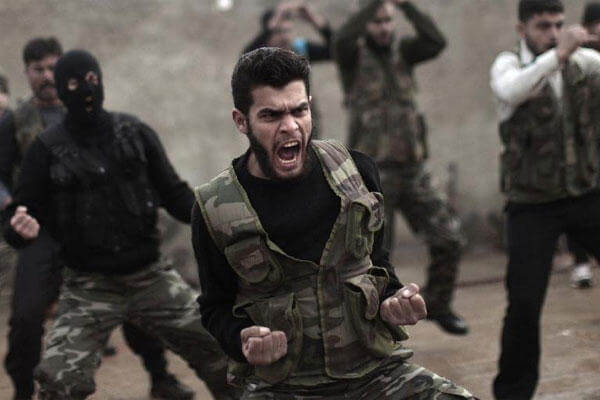The small group of lightly-equipped "moderate" Syrian rebels vetted and trained by the U.S. and now on the ground in northern Syria will be provided with limited defensive air cover, a Pentagon official said Monday.
Navy Capt. Jeff Davis, a Pentagon spokesman, took pains to distinguish between offensive and defensive airstrikes in support of the 50-60 rebels who crossed into Syria from Turkey last month while denying that the U.S. was being caught up in "mission creep" in the many-sided Syrian civil war.
"Our offensive operations in Syria are limited to anti-ISIL," Davis said, using another acronym for ISIS, "but with regards to the new Syrian forces, they could potentially face a broader range of threats. For defensive purposes, we will help to defend them from other sources of threats."
In response to Davis remarks at a Pentagon briefing, Sen. John McCain, a persistent critic of the Obama administration's policy on Syria and Iraq, quickly put out a statement saying the latest move by the U.S. military didn't go far enough.
McCain, chairman of the Senate Armed Services Committee, said he was pleased with the announcement of limited air support for the Syrian rebels but "I am concerned that this is another example of a policy of gradual escalation that has plagued U.S. efforts since the start of the conflict in Syria."
"It is also disappointing that the support we will provide appears limited only to northern Syria, and will not extend to Syrian groups fighting ISIL in the south and other parts of the country," McCain said, referring to other Syrian rebels reportedly being trained in Jordan.
Russia, one of the main supporters of the regime of Syrian president Bashar al-Assad along with Iran, also criticized the decision on air cover for the rebels.
"Moscow has stressed multiple times that helping the Syrian opposition, let alone helping with financial or technical means, would lead to a further destabilization of the situation in the country," Kremlin spokesman Dmitry Peskov told reporters.
At a Pentagon briefing, Davis rejected charges that the air support for the rebels amounted to "mission creep" in a civil war.
"I wouldn't say that. I think I've been clear for quite some time that we're going to be providing defensive support to these people," Davis said.
"The moderate opposition forces there continue to be attacked on multiple fronts," Davis said. "This includes from the Assad regime, as well as violent extremists like al Nusra and ISIL. The Nusra Front has publicly declared itself as an al Qaeda affiliate; it shares al Qaeda's terrorist aims and agenda," Davis said.
Davis said the Syrian rebel force backed by the U.S. came under attack again last Friday. He would not identify the group responsible for the attack but said it "looked a lot like Nusra Front."
-- Richard Sisk can be reached at richard.sisk@military.com





























